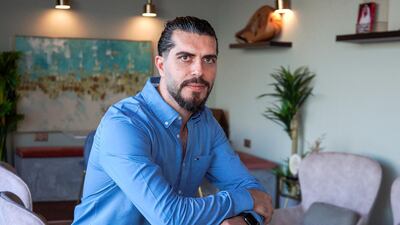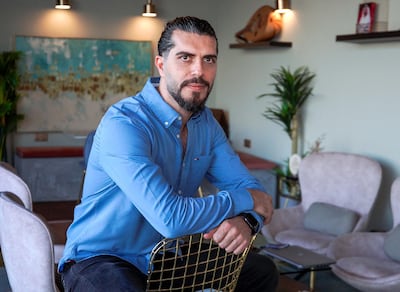An Abu Dhabi resident has told of the "psychological challenge" he faced after twice testing positive for Covid-19 within weeks.
Salem Muqattash's plan to visit family in the US was thrown into disarray when he was found to have contracted the virus shortly after his arrival in the country on December 2.
The 32-year-old was clear of infection when taking a PCR test in the Emirates 96 hours prior to his flight to Chicago.
Mr Muqattash decided to stay in a hotel on arrival and take a further test before staying with his family.
“I decided to stay in a hotel for three days before seeing my family to make sure I was fine," said Mr Muqattash, from Jordan.
“Some members are older, so I had to be very careful."
Mr Muqattash was right to be cautious.
“From the second day, I started feeling symptoms and when I did the test on the third day it was positive,” said the structural engineer.
He stayed at the hotel for seven more days, not requiring hospital treatment as his symptoms were minor.
“I told my family I was still in Dubai so they did not get worried, and they were staying in a different state, so I did not want anyone to travel to see me.
"It would have been too risky and there was nothing they could do for me anyway, I was fine.”
He finally tested negative then travelled on to Arizona to visit his family.
“I spent 25 days with them. Having a loving family helps us face many miseries in life and they know how to make you feel happy," Mr Muqattash said.
“And of course spending time with family is the most exciting thing we can do after a long time of home isolation.”
Mr Muqattash took another PCR test, which came back negative, before flying back to the Emirates.
Coronavirus in the UAE:
He was asked to take a further test on arrival at Dubai International Airport and spent the night at the airport hotel awaiting the results.
He received the result on January 8, which to his surprise was a second positive. He said he had a mild fever, but his symptoms remained light.
He was allowed to quarantine at home in Abu Dhabi after explaining his situation to border officials.
“I live alone anyway, so it was convenient," he said.
"I barely experienced the symptoms that other patients describe, I slightly lost sense of taste and my hearing became less for a few days, but I think it was psychological. When you hear it from others you expect to have it too."
The biggest hurdle he had to overcome was the prolonged period of isolation owing to two positive tests in such close proximity.
“Being quarantined is a psychological challenge, it’s an impact on our health in one way or another – the boredom, the loneliness, the frustration,” he said.
“It is an incredible feeling when you are free to go out, such a great feeling of happiness."
Mr Muqattash does not dismiss the possibility of contracting the virus again.
He strictly follows safety measures to protect his health and those around him.
He said two bouts of quarantine had made him appreciate the importance of human contact.
“When you are isolated you understand the meaning of friendship, community and social life," he said.
“I discovered no one can live alone [without friends] after I lived alone for 10 days twice. Even if you have a strong personality you still need social support.”
He said friends rallied round when he self-isolated in Abu Dhabi, often delivering food to his doorstep.
He wished to spend time with them but knew only too well he could take no risks.
Mr Muqattash said he now felt "perfectly fine" and did not suffer from any lingering effects from his experience.
Two positive tests a rarity, says doctor
Dr Mohaymen Abdelghany, chief executive of Danat Al Emarat Hospital in Abu Dhabi, said it was uncommon for someone to contract the virus twice.
He said it was possible that some of those diagnosed with the virus twice might have received false negatives and had, in fact, undergone a prolonged recovery from a single bout of coronavirus.
“We have to understand the limitation of the PCR, because it is only 70 per cent accurate, so he could be one of the unlucky ones who got an inaccurate result,” he said.
Experts say reinfections are infrequent, but a number of such cases have been reported around the world, highlighting the need to follow safety measures at all times.






















